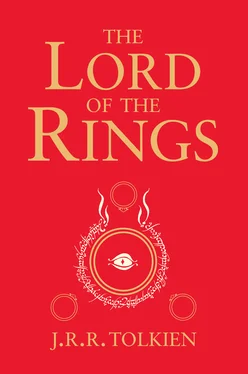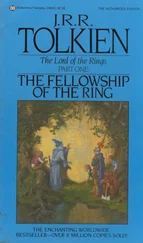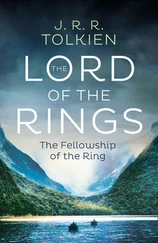After their breakfast the hobbits had to re-pack, and get together further supplies for the longer journey they were now expecting. It was close on ten o’clock before they at last got off. By that time the whole of Bree was buzzing with excitement. Frodo’s vanishing trick; the appearance of the black horsemen; the robbing of the stables; and not least the news that Strider the Ranger had joined the mysterious hobbits, made such a tale as would last for many uneventful years. Most of the inhabitants of Bree and Staddle, and many even from Combe and Archet, were crowded in the road to see the travellers start. The other guests in the inn were at the doors or hanging out of the windows.
Strider had changed his mind, and had decided to leave Bree by the main road. Any attempt to set off across country at once would only make matters worse: half the inhabitants would follow them, to see what they were up to, and to prevent them from trespassing.
They said farewell to Nob and Bob, and took leave of Mr. Butterbur with many thanks. ‘I hope we shall meet again some day, when things are merry once more,’ said Frodo. ‘I should like nothing better than to stay in your house in peace for a while.’
They tramped off, anxious and downhearted, under the eyes of the crowd. Not all the faces were friendly, nor all the words that were shouted. But Strider seemed to be held in awe by most of the Bree-landers, and those that he stared at shut their mouths and drew away. He walked in front with Frodo; next came Merry and Pippin; and last came Sam leading the pony, which was laden with as much of their baggage as they had the heart to give it; but already it looked less dejected, as if it approved of the change in its fortunes. Sam was chewing an apple thoughtfully. He had a pocket full of them: a parting present from Nob and Bob. ‘Apples for walking, and a pipe for sitting,’ he said. ‘But I reckon I’ll miss them both before long.’
The hobbits took no notice of the inquisitive heads that peeped out of doors, or popped over walls and fences, as they passed. But as they drew near to the further gate, Frodo saw a dark ill-kept house behind a thick hedge: the last house in the village. In one of the windows he caught a glimpse of a sallow face with sly, slanting eyes; but it vanished at once.
‘So that’s where that southerner is hiding!’ he thought. ‘He looks more than half like a goblin.’
Over the hedge another man was staring boldly. He had heavy black brows, and dark scornful eyes; his large mouth curled in a sneer. He was smoking a short black pipe. As they approached he took it out of his mouth and spat.
‘Morning, Longshanks!’ he said. ‘Off early? Found some friends at last?’ Strider nodded, but did not answer.
‘Morning, my little friends!’ he said to the others. ‘I suppose you know who you’ve taken up with? That’s Stick-at-naught Strider, that is! Though I’ve heard other names not so pretty. Watch out tonight! And you, Sammie, don’t go ill-treating my poor old pony! Pah!’ He spat again.
Sam turned quickly. ‘And you, Ferny,’ he said, ‘put your ugly face out of sight, or it will get hurt.’ With a sudden flick, quick as lightning, an apple left his hand and hit Bill square on the nose. He ducked too late, and curses came from behind the hedge. ‘Waste of a good apple,’ said Sam regretfully, and strode on.
At last they left the village behind. The escort of children and stragglers that had followed them got tired and turned back at the South-gate. Passing through, they kept on along the Road for some miles. It bent to the left, curving back into its eastward line as it rounded the feet of Bree-hill, and then it began to run swiftly downwards into wooded country. To their left they could see some of the houses and hobbit-holes of Staddle on the gentler south-eastern slopes of the hill; down in a deep hollow away north of the Road there were wisps of rising smoke that showed where Combe lay; Archet was hidden in the trees beyond.
After the Road had run down some way, and had left Bree-hill standing tall and brown behind, they came on a narrow track that led off towards the North. ‘This is where we leave the open and take to cover,’ said Strider.
‘Not a “short cut”, I hope,’ said Pippin. ‘Our last short cut through woods nearly ended in disaster.’
‘Ah, but you had not got me with you then,’ laughed Strider. ‘My cuts, short or long, don’t go wrong.’ He took a look up and down the Road. No one was in sight; and he led the way quickly down towards the wooded valley.
His plan, as far as they could understand it without knowing the country, was to go towards Archet at first, but to bear right and pass it on the east, and then to steer as straight as he could over the wild lands to Weathertop Hill. In that way they would, if all went well, cut off a great loop of the Road, which further on bent southwards to avoid the Midgewater Marshes. But, of course, they would have to pass through the marshes themselves, and Strider’s description of them was not encouraging.
However, in the meanwhile, walking was not unpleasant. Indeed, if it had not been for the disturbing events of the night before, they would have enjoyed this part of the journey better than any up to that time. The sun was shining, clear but not too hot. The woods in the valley were still leafy and full of colour, and seemed peaceful and wholesome. Strider guided them confidently among the many crossing paths, although left to themselves they would soon have been at a loss. He was taking a wandering course with many turns and doublings, to put off any pursuit.
‘Bill Ferny will have watched where we left the Road, for certain,’ he said; ‘though I don’t think he will follow us himself. He knows the land round here well enough, but he knows he is not a match for me in a wood. It is what he may tell others that I am afraid of. I don’t suppose they are far away. If they think we have made for Archet, so much the better.’
Whether because of Strider’s skill or for some other reason, they saw no sign and heard no sound of any other living thing all that day: neither two-footed, except birds; nor four-footed, except one fox and a few squirrels. The next day they began to steer a steady course eastwards; and still all was quiet and peaceful. On the third day out from Bree they came out of the Chetwood. The land had been falling steadily, ever since they turned aside from the Road, and they now entered a wide flat expanse of country, much more difficult to manage. They were far beyond the borders of the Bree-land, out in the pathless wilderness, and drawing near to the Midgewater Marshes.
The ground now became damp, and in places boggy and here and there they came upon pools, and wide stretches of reeds and rushes filled with the warbling of little hidden birds. They had to pick their way carefully to keep both dry-footed and on their proper course. At first they made fair progress, but as they went on, their passage became slower and more dangerous. The marshes were bewildering and treacherous, and there was no permanent trail even for Rangers to find through their shifting quagmires. The flies began to torment them, and the air was full of clouds of tiny midges that crept up their sleeves and breeches and into their hair.
‘I am being eaten alive!’ cried Pippin. ‘Midgewater! There are more midges than water!’
‘What do they live on when they can’t get hobbit?’ asked Sam, scratching his neck.
They spent a miserable day in this lonely and unpleasant country. Their camping-place was damp, cold, and uncomfortable; and the biting insects would not let them sleep. There were also abominable creatures haunting the reeds and tussocks that from the sound of them were evil relatives of the cricket. There were thousands of them, and they squeaked all round, neek-breek , breek-neek , unceasingly all the night, until the hobbits were nearly frantic.
Читать дальше












